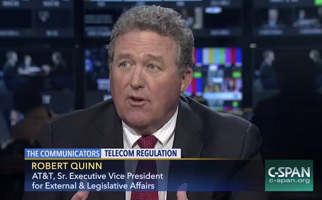Quinn: AT&T Is Big Backer of Blackburn Privacy Bill

The smarter way to stay on top of broadcasting and cable industry. Sign up below
You are now subscribed
Your newsletter sign-up was successful
Top AT&T D.C. exec Robert Quinn said his company is "very, very" supportive of a bill from Rep. Marsha Blackburn (R-Tenn.)—chair of the House Communications Subcommittee—that would "harmonize" the enforcement of online privacy by ISPs and edge providers like Google and Facebook.
Quinn—senior executive VP of external and legislative affairs and who directs the company's lobbying efforts—was being interviewed for C-SPAN's Communicators series.
Blackburn has introduced the Balancing the Rights of Web Surfers Equally and Responsibly (BROWSER) Act of 2017 that would designate the Federal Trade Commission as the sole enforcer of online privacy and apply the same privacy regime to ISPs and edge providers, a regime similar to the one the FCC imposed on ISPs before it was nullified.
He said AT&T backed the bill for three main reasons. First, he said, it said everyone has to live under the same rules. He said that Google and Amazon are getting into video distribution and "look a lot like us," there should be equal treatment. "All of these companies should operate under the same rules," which was why he said AT&T opposed the FCC's broadband privacy rules, which Blackburn helped nullify using the Congressional Review Act. Second, he said, was putting all the regulation at the Federal Trade Commission, so it would be the same rules and the same regulator, rather than dividing it up between the FCC and FTC.
Third, he said, the bill preempts state privacy laws, which means there aren't 50 different state regimes around privacy. "There is a rule that everyone has to live with" rather than a "patchwork" of rules.
While some opponents of an opt-in regime for sharing users' web info with third parties, notably major ad groups, say they can't support the Blackburn bill because of that uniform opt-in standard, Quinn said AT&T is less concerned about that than about regulatory parity, both in terms of the rules and having one regulator.
Quinn also said AT&T is very supportive of an open internet, something he said is routinely mischaracterized by the company's opponents.
The smarter way to stay on top of broadcasting and cable industry. Sign up below
He said the company backs rules that "preserve an open internet." He signaled, as have most ISPs, that those rules would generally be no blocking, no throttling, no censorship." As with other ISPs, Quinn did not mention paid prioritization, which is the third of the bright-line rules—no blocking, no throttling, no paid prioritization—adopted by the FCC in 2015.
What AT&T opposes, he said, is putting the rules under Title II, which he called an antiquated statute to regulate telephone rates. He said AT&T was opposed to Title II because it thought it would ultimately result in "significant rate regulation," which would affect investment, job creation and more.
He said AT&T was hopeful that at the end of the process—FCC chairman Ajit Pai's reconsideration of the Open Internet order, including rolling back Title II classification—"we'll end up with some basic open internet principles or rules that can be enforced," but the government would "walk away once and for all" from Title II regulation.
But Quinn said he feared that whatever this FCC does, the pendulum could swing back, which was why it would be better for Congress to step in. He said the only way to ensure enforceable rules is through legislation.
Asked why the Googles and Amazons see the net neutrality issue differently from AT&T, Quinn said there were a lot of people who don't believe the company is for an open internet even though he said it was a bigger proponent for the 2010, non-Title II-based, open internet rules than Google was.
Asked about the status of the AT&T-Time Warner merger, he did not have much to update. He signaled the company was still "pretty confident" it would be able to close the deal by the end of the year.
Quinn said conversations about what conditions might be put on the deal were just beginning, given that Congress has not yet confirmed the new head of the antitrust division, though they had been looking for that to happen before the July 4 recess.
The Communicators episode featuring Quinn airs on C-SPAN at 6:30 p.m. ET, Saturday, June 24, and on C-SPAN2 at 8 a.m. and 8 p.m. ET on Monday, June 26.
Contributing editor John Eggerton has been an editor and/or writer on media regulation, legislation and policy for over four decades, including covering the FCC, FTC, Congress, the major media trade associations, and the federal courts. In addition to Multichannel News and Broadcasting + Cable, his work has appeared in Radio World, TV Technology, TV Fax, This Week in Consumer Electronics, Variety and the Encyclopedia Britannica.

